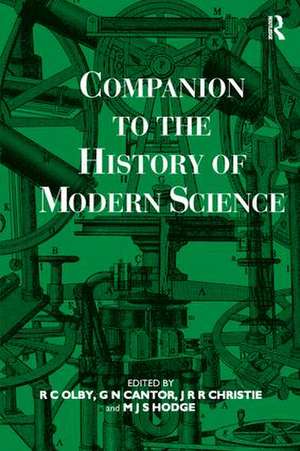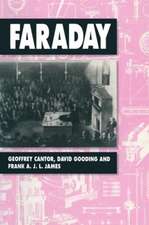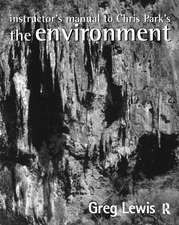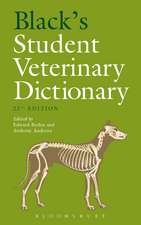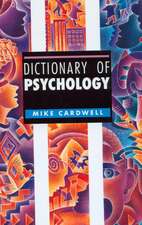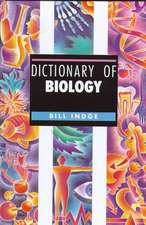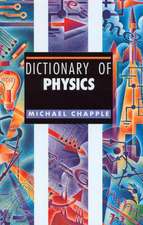Companion to the History of Modern Science
Editat de G N Cantor, G.N. Cantor, J.R.R. Christie, M.J.S. Hodge, R. Colbyen Limba Engleză Hardback – 21 apr 2016
Areas covered include:
* the Copernican Revolution
* Genetics
* Science and Imperialism
* the History of Anthropology
* Science and Religion
* Magic and Science.
The companion is an indispensable resource for students and professionals in History, Philosophy, Sociology and the Sciences as well as the History of Science. It will also appeal to the general reader interested in an introduction to the subject.
| Toate formatele și edițiile | Preț | Express |
|---|---|---|
| Paperback (1) | 750.90 lei 43-57 zile | |
| Taylor & Francis – 4 iul 1996 | 750.90 lei 43-57 zile | |
| Hardback (1) | 764.20 lei 43-57 zile | |
| Taylor & Francis – 21 apr 2016 | 764.20 lei 43-57 zile |
Preț: 764.20 lei
Preț vechi: 1154.59 lei
-34% Nou
Puncte Express: 1146
Preț estimativ în valută:
146.25€ • 152.12$ • 120.74£
146.25€ • 152.12$ • 120.74£
Carte tipărită la comandă
Livrare economică 14-28 aprilie
Preluare comenzi: 021 569.72.76
Specificații
ISBN-13: 9781138141216
ISBN-10: 1138141216
Pagini: 1108
Dimensiuni: 156 x 234 mm
Greutate: 0.45 kg
Ediția:1
Editura: Taylor & Francis
Colecția Routledge
Locul publicării:Oxford, United Kingdom
ISBN-10: 1138141216
Pagini: 1108
Dimensiuni: 156 x 234 mm
Greutate: 0.45 kg
Ediția:1
Editura: Taylor & Francis
Colecția Routledge
Locul publicării:Oxford, United Kingdom
Public țintă
Postgraduate and UndergraduateCuprins
Preface -- Introduction -- The Editors -- PART I: THE STUDY OF THE HISTORY OF SCIENCE -- Section IA: History of science in relation to neighbouring disciplines -- 1. The development of the historiography of science /J. R. R. Christie -- 2. The history of science and the working scientist /John R. G. Turner -- 3. The history of science and the history of society /Roy Porter -- 4. The history of science and the philosophy of science /Larry Laudan -- 5. Sociological theories of scientific knowledge /Barry Barnes -- Section IB: Analytical perspectives -- 6. Marxism and the history of science /Robert M. Young -- 7. The sociology of the scientific community /Trevor Pinch -- 8. Feminism and the history of science /J. R. R. Christie -- 9. Language, discourse and science /J. V Golinski -- Section IC: Philosophical problems -- 10. Continental philosophy and the history of science /Gary Gutting -- 11. Discovery /T. Nickles -- 12. Rationality, science and history /Larry Briskman -- 13. Realism /W. H. Newton-Smith -- PART II: SELECTED WRITINGS IN THE HISTORY OF SCIENCE -- Section IIA: Turning points -- 14. The Copemican revolution /J. R. Ravetz -- 15. The Scientific Revolution /John A. Schuster -- 16. Newton and natural philosophy /Alan Gabbey -- 17. The chemical revolution Carleton /E. Perrin -- 18. Laplacian physics /Robert Fox -- 19. Natural history, 1670-1802 /Phillip R. Sloan -- 20. The history of geology, 1780-1840 /Rachel Laudan -- 21. Energy /Crosbie Smith -- 22. Electromagnetic theory in the nineteenth century /M. Norton Wise -- 23. Cell theory and development /Jane Maienschein -- 24. Origins and species before and after Darwin /M.J.S.Hodge -- 25. William Wundt and the emergence of experimental psychology /K. Danziger -- 26. Behaviourism /Roger Smith -- 27. Freud and psychoanalysis /Raymond E. Fancher -- 28. The theory of relativity /John Stachel -- 29- Quantum theory /Michael Redhead -- 30. Classical economics and the Keynesian revolution /Bill Gerrard -- 3i- From physiology to biochemistry /Neil Morgan -- 32- The molecular revolution in biology /Robert Olby -- 33- The emergence of genetics /Robert Olby -- 34- Cybernetics and information technology /Michael S. Mahoney -- Section IIB: Topics and interpretations -- 35- Aristotelian science /A. George Molland -- 36. The heart and blood from Vesalius to Harvey /Andrew Wear -- 37- Magic and science in the sixteenth and seventeenth centuries /John Henry -- 38. Atomism and the mechanical philosophy /Martin Tamny -- 39- Newtonianism /Simon Schaffer -- 40. Physical optics /G. N. Cantor -- 4i- Cosmology: Newton to Einstein /Pierre Kerszberg -- 42. Geometry and space /J.J. Gray -- 43- Particle science /Helge Kragh -- 44- The foundations of mathematics /Philip Kitcher -- 45- Probability and determinism, 1650-1900 /Ian Hacking -- 46. The mind-body problem /Robert M. Young -- 47- Paradigmatic traditions in the history of anthropology /George W. Stocking -- -- 48. Physiology and experimental medicine /John V Picks tone -- 49. Geography /David N. Livingstone -- Section IIC: Themes -- 50. Science and religion /John Hedley Brooke -- 51. Science and literature /Gillian Beer -- 52. Science and philosophy /George Macdonald Ross -- 53. The development of philosophy of science, 1600-1900 /Eman McMullin -- 54. The development of philosophy of science since 1900 /M. J. S. Hodge and G. N. Cantor -- 55. The classification of the sciences /Nicholas Fisher -- 56. Marginal science /Seymour H. Mauskopf -- 57. Science, alienation and oppression /Robert M. Young -- 58. Orthodoxies, critiques and alternatives /J. R. Ravetz -- 59. Nationalism and internationalism /Brigitte Schroeder-Gudehus -- 60. Science and imperialism /Lewis Pyenson -- 61. Science and war /D. E. M. Edgerton -- 62. Science education /W. H. Brock -- 63. The organisation of science and its pursuit in early modem Europe /Roger L. Emerson -- 64. Professionalisation /J. B. Morrell -- 65. Science and the public /Steven Shapin -- 66. Science and political ideology, 1790-1848 /Dorinda Outram -- 67. Natural science and social theory /Theodore M. Porter -- The Contributors -- Index of names -- Index of subjects.
Notă biografică
Robert Olby, Geoffrey Cantor, John Christie, and Jonathon Hodge are all in the Division of the History of Science at the University of Leeds.
Recenzii
Some reviews of the well-received hardback edition:
'Indeed a companion volume whose 67 essays give pleasure and instruction. References are copious, yet not so comprehensive as to deter the novice from further research into a still young field ... an ambitious and successful work.' - Times Literary Supplement
'This work is an essential resource for libraries everywhere. For specialist science libraries willing to keep just one encyclopaedic guide to history, for undergraduate libraries seeking to provide easily accessible information, for the devisers of university curricula, for the modern social historian or even the eclectic scientist taking a break from simply making history, this is the book for you.' - Times Higher Education Supplement
'Specialists will enjoy browsing, especially in areas outside their own. Newcomers ... will find provocative and stimulating insights into today's practice in the history of science.' - Choice
'A pleasure to read with a carefully chosen typeface, well organized pages and ample margins ... it is very easy to find one's way around. This is a book which will be consulted widely.' - Technovation
'Attractively produced and elaborately indexed, [Companion to the History of Modern Science] accomplishes very well what it was intended to do.' - Sci-Tech Book News
'This is a commendably easy book to use.' - British Journal of the History of Science
'This is an important one-volume work for those interested in taking basic information one step further.' - Preview
'Excellent ... I recommend this book highly.' - Science Books and Films
'A triumph of editorial skill and determination. The articles are clearly laid out, with extensive endnotes and bibliography after each article ... an invaluable resource, make sure it is ordered by your local library!' - Scientific and Medical Network
'Scholars from other areas entering this field, students taking the vertical approach and teachers coming from any direction cannot fail to find this an invaluable text.' - History of Science Journal
'An excellent compendium of some of the most interesting commentators on science today.' - New Scientist
'Indeed a companion volume whose 67 essays give pleasure and instruction. References are copious, yet not so comprehensive as to deter the novice from further research into a still young field ... an ambitious and successful work.' - Times Literary Supplement
'This work is an essential resource for libraries everywhere. For specialist science libraries willing to keep just one encyclopaedic guide to history, for undergraduate libraries seeking to provide easily accessible information, for the devisers of university curricula, for the modern social historian or even the eclectic scientist taking a break from simply making history, this is the book for you.' - Times Higher Education Supplement
'Specialists will enjoy browsing, especially in areas outside their own. Newcomers ... will find provocative and stimulating insights into today's practice in the history of science.' - Choice
'A pleasure to read with a carefully chosen typeface, well organized pages and ample margins ... it is very easy to find one's way around. This is a book which will be consulted widely.' - Technovation
'Attractively produced and elaborately indexed, [Companion to the History of Modern Science] accomplishes very well what it was intended to do.' - Sci-Tech Book News
'This is a commendably easy book to use.' - British Journal of the History of Science
'This is an important one-volume work for those interested in taking basic information one step further.' - Preview
'Excellent ... I recommend this book highly.' - Science Books and Films
'A triumph of editorial skill and determination. The articles are clearly laid out, with extensive endnotes and bibliography after each article ... an invaluable resource, make sure it is ordered by your local library!' - Scientific and Medical Network
'Scholars from other areas entering this field, students taking the vertical approach and teachers coming from any direction cannot fail to find this an invaluable text.' - History of Science Journal
'An excellent compendium of some of the most interesting commentators on science today.' - New Scientist
Descriere
A descriptive analysis of the development of Western science from AD 1500, and of the diversity and course of that development, first in Europe and later across the world.
